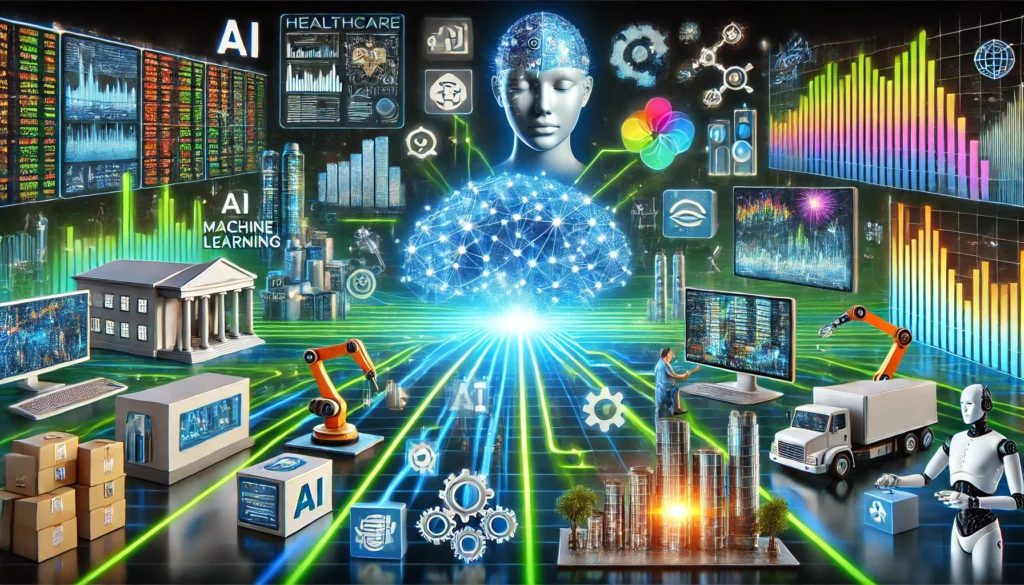AI machine learning is revolutionizing how technology interacts with the world. It refers to systems that learn and improve from experience, adjusting their actions based on new data. This type of technology enables computers and applications to function autonomously and become more accurate over time without human intervention. The integration of AI machine learning into various sectors has sparked massive innovation, helping businesses and industries streamline operations and enhance decision-making.
In this article, we will delve deep into the concept of AI machine learning, its applications, and how it is reshaping different industries. Let’s explore the fascinating world of AI machine learning and how it’s evolving.
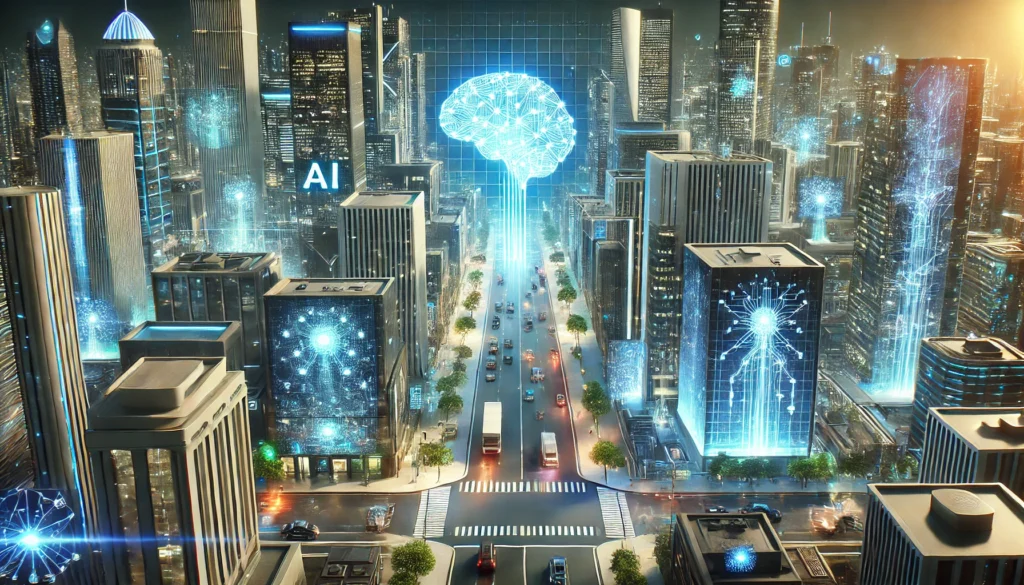
What is AI Machine Learning?
AI machine learning is a subfield of artificial intelligence that focuses on the development of algorithms that allow computers to learn from and make predictions or decisions based on data. Unlike traditional programming, where every task must be explicitly coded, AI machine learning systems learn and adapt without direct human input.
The fundamental idea behind AI machine learning is that computers can improve their performance as they are exposed to more data. This enables them to recognize patterns, identify trends, and make decisions that were previously handled only by humans. Over time, AI machine learning systems become more accurate and effective, leading to improved performance and higher efficiency.
Types of AI Machine Learning
AI machine learning can be classified into three main types:
- Supervised Learning
In supervised learning, the model is trained using labeled data, meaning the input data and corresponding outputs are provided. The model uses this data to learn patterns and make predictions. Once trained, it can predict outcomes for new, unseen data. Examples include classification tasks, such as identifying whether an email is spam or not. - Unsupervised Learning
Unsupervised learning works with unlabeled data. The algorithm identifies patterns, structures, and relationships within the data without prior knowledge of the correct output. Clustering and association are common examples of unsupervised learning. - Reinforcement Learning
In reinforcement learning, the AI agent learns by interacting with its environment. It makes decisions based on rewards or penalties received from its actions, gradually improving its strategy over time. This type of learning is widely used in robotics, gaming, and autonomous vehicles.
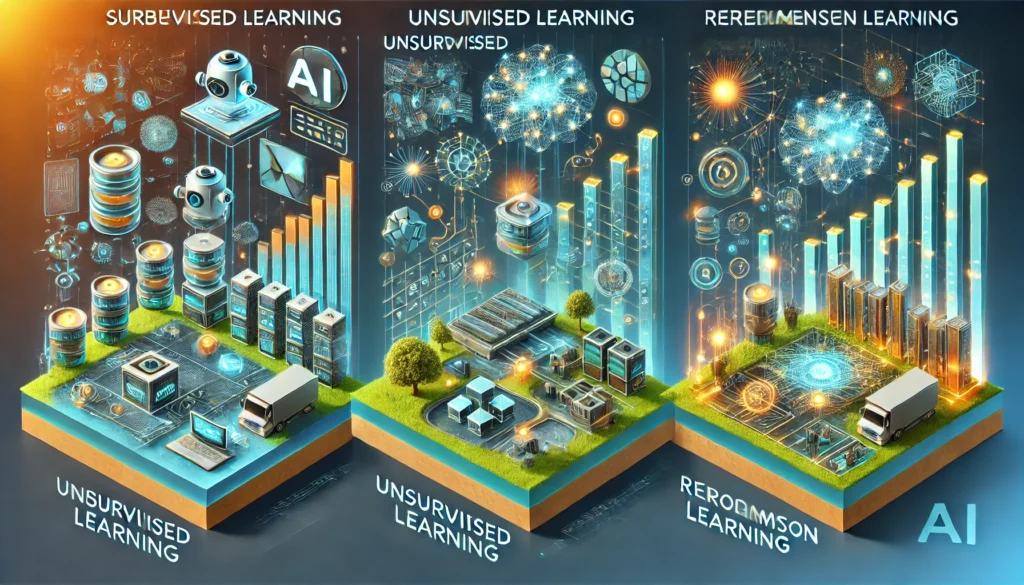
How AI Machine Learning Works
The process of AI machine learning involves several key stages:
- Data Collection
Data is the foundation of machine learning. The more relevant and clean data the system has, the more accurate its predictions will be. The first step is gathering large amounts of data from various sources. - Data Preprocessing
Raw data often contains noise and irrelevant information. Data preprocessing is the process of cleaning, transforming, and normalizing data to make it usable for machine learning models. - Model Training
The next step involves selecting a model and training it on the prepared data. The machine learning algorithm uses this data to learn patterns and relationships. - Evaluation and Testing
Once the model is trained, it’s evaluated using test data to ensure that it performs well. Metrics such as accuracy, precision, and recall help assess its effectiveness. - Deployment and Improvement
After the model is validated, it’s deployed into real-world applications. Continuous feedback and new data are used to refine and enhance the model, making it more effective over time.
The Impact of AI Machine Learning Across Industries
AI machine learning is making significant strides in various sectors, improving efficiency, reducing costs, and driving innovation. Let’s look at some key industries that benefit from this technology:
Healthcare
AI machine learning is transforming healthcare by enabling early diagnosis, personalized treatment plans, and faster drug development. Machine learning algorithms analyze medical data, such as patient records and diagnostic images, to assist doctors in making more accurate diagnoses. AI-driven tools also support clinical decision-making, recommending the best treatments based on individual patient data.
Retail and E-Commerce
Artificial machine learning enhances the customer experience in retail and e-commerce by personalizing recommendations and predicting shopping behavior. It helps businesses understand customer preferences, optimize inventory management, and improve sales forecasts. With AI-driven chatbots and virtual assistants, retailers can provide 24/7 customer service, improving user engagement and satisfaction.
Finance
In the financial sector, AI machine learning is used to predict market trends, detect fraud, and automate trading strategies. By analyzing vast amounts of financial data, machine learning models help financial institutions make better investment decisions, reduce risks, and streamline operations.
Manufacturing
In manufacturing, Artificial machine learning optimizes production processes, reduces downtime, and improves product quality. Predictive maintenance powered by machine learning allows manufacturers to identify equipment issues before they cause failures, saving time and money.
Automotive
The automotive industry is embracing AI machine learning to power autonomous vehicles. These vehicles use machine learning algorithms to interpret data from sensors and cameras, enabling them to navigate roads and make decisions like a human driver. AI-powered systems also improve traffic management and route optimization, making transportation safer and more efficient.
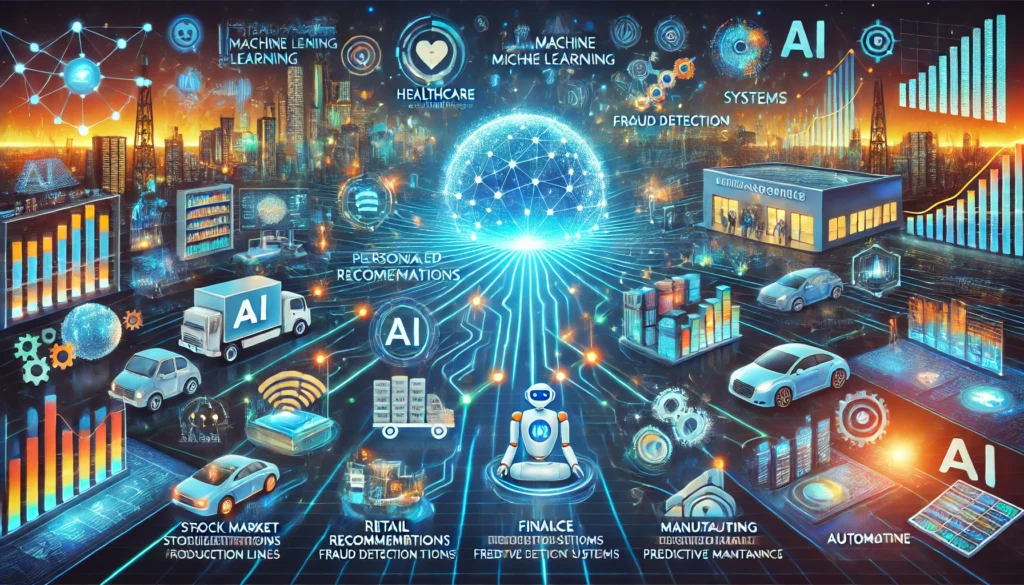
Challenges of AI Machine Learning
While AI machine learning offers tremendous benefits, there are also several challenges to address:
- Data Privacy and Security
AI machine learning systems rely heavily on data, and ensuring that this data is protected is a major concern. Safeguarding sensitive information and ensuring compliance with privacy regulations is essential for building trust in AI systems. - Bias in Algorithms
Machine learning models can inherit biases from the data they are trained on. If the training data is biased, the algorithm’s predictions and decisions may also be biased, leading to unfair outcomes. Addressing bias and ensuring fairness in AI models is crucial for their ethical use. - Lack of Interpretability
Some AI machine learning models, such as deep learning, are often seen as “black boxes” because it’s difficult to understand how they make decisions. This lack of transparency can be a significant barrier in high-stakes fields like healthcare and finance, where accountability is essential. - Cost of Implementation
Implementing AI machine learning requires significant investment in technology, data infrastructure, and skilled professionals. Smaller businesses may find it challenging to adopt these technologies without substantial resources.
The Future of AI Machine Learning
As AI machine learning continues to evolve, its potential applications are limitless. The technology is expected to become even more integrated into our daily lives, enabling smarter cities, improved healthcare, and greater efficiencies across industries. Advancements in quantum computing and edge computing will further accelerate the capabilities of AI machine learning, making it even more powerful and accessible.
Ethical Considerations of AI Machine Learning
The rise of Artificial machine learning brings ethical challenges. It’s crucial for governments, businesses, and researchers to ensure that AI systems are developed responsibly and with proper oversight. Ensuring AI transparency, avoiding discrimination, and making sure that AI technologies benefit society are key priorities for the future.
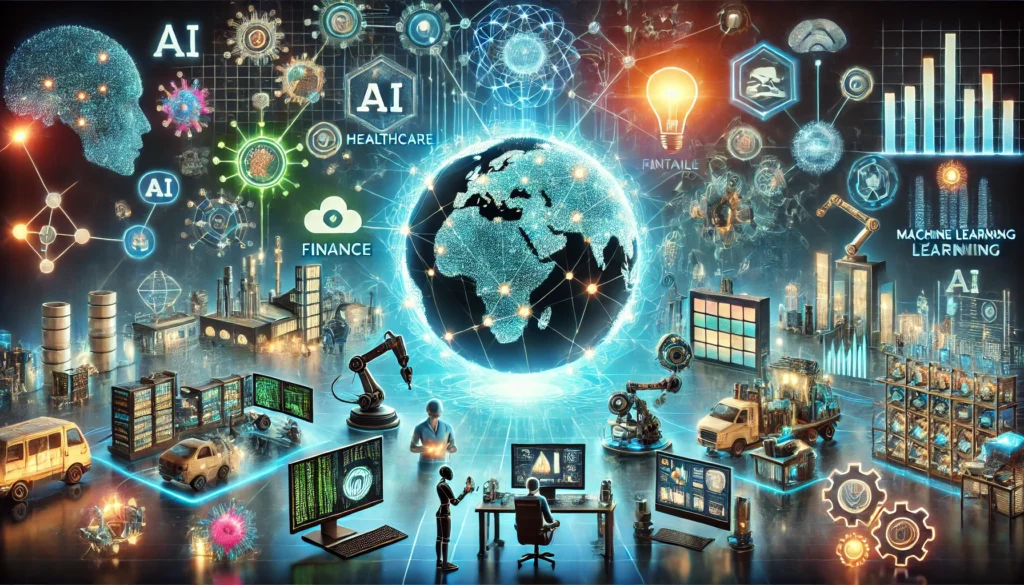
Conclusion
Artificial machine learning is transforming industries, enhancing productivity, and driving innovations across the globe. Its ability to analyze vast amounts of data, predict outcomes, and improve performance is reshaping everything from healthcare to finance, retail, and manufacturing. Despite challenges related to data privacy, bias, and cost, AI machine learning offers tremendous potential to shape the future of technology. As the field continues to evolve, it’s clear that AI machine learning will play a pivotal role in driving progress and efficiency in the years ahead.
FAQs
Q: What is AI machine learning?
Artificial machine learning refers to systems that learn from data and improve their performance over time without direct human intervention. It allows machines to make decisions and predictions based on patterns in the data.
Q: How does AI machine learning work?
Artificial machine learning works by collecting data, preprocessing it, training models using algorithms, and then evaluating and testing the model’s performance. Continuous feedback is used to improve the system over time.
Q: What are the applications of AI machine learning?
Artificial machine learning has a wide range of applications across industries, including healthcare, finance, retail, manufacturing, and automotive. It enhances decision-making, predicts outcomes, and optimizes processes.
Q: What are the challenges of Artificial machine learning?
Some of the main challenges include data privacy and security, algorithmic bias, lack of interpretability, and the cost of implementation.
Q: Will AI machine learning replace human jobs?
While AI machine learning may automate certain tasks, it is unlikely to replace all human jobs. Instead, it will augment human capabilities, allowing people to focus on higher-level tasks and strategic decision-making.
Q: What is the future of Artificial machine learning?
The future of AI machine learning is bright, with advancements in quantum computing and edge computing expected to enhance its capabilities. AI will continue to impact industries, improve efficiencies, and create new opportunities in the years ahead.

